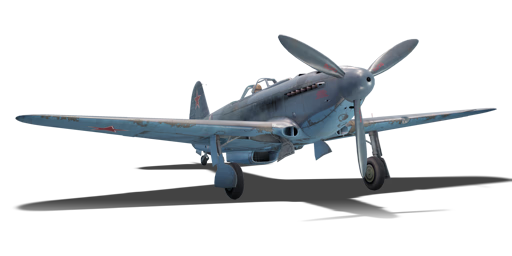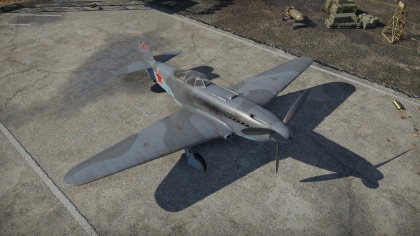Yak-9UT
Contents
| This page is about the Russian fighter Yak-9UT. For other uses, see Yak-9 (Family). |
Description
The Yak-9UT is a rank Russian fighter
with a battle rating of (AB), (RB), and (SB). It was introduced in Update 1.37.
General info
Flight Performance
The Yak-9UT has an extremely high acceleration which is ehanced due to the new Klimov M-107 engine, but like all Yaks, it has a low engine performance at high altitudes but isn't as bad as VK-105 powered Yaks. It also has a pretty good manoeuvrability that gets better at higher speeds (above 400 kph) but you will still be outmanoeuvered by Zeroes and Spitfires.
The Yak-9UT doesn't have any bombs but has access to other gun settings, by default you have twin B-20S 20mm cannons mounted on th top of the nose and a single 23mm cannon mounted in the propeller nose, you have also access to the twin B-20S and a N-37 37mm cannon with higher damage but less ammo and fire rate and last gun setting, a single B-20S and a N-45 45mm cannon with only HEFI-T rounds (High Explosive Fragmentation Incendiary Tracers) that has a little more ammo than the 37mm cannon and has a higher bullet speed than the 37mm
| Characteristics | |||||||
|---|---|---|---|---|---|---|---|
| Stock | |||||||
| Max Speed (km/h at 5,000 m) |
Max altitude (meters) |
Turn time (seconds) |
Rate of climb (meters/second) |
Take-off run (meters) | |||
| AB | RB | AB | RB | AB | RB | ||
| 650 | 631 | 20.2 | 20.8 | 14.9 | 14.9 | 380 | |
| Upgraded | |||||||
| Max Speed (km/h at ?,??? m) |
Max altitude (meters) |
Turn time (seconds) |
Rate of climb (meters/second) |
Take-off run (meters) | |||
| AB | RB | AB | RB | AB | RB | ||
| ??? | ??? | ??.? | ??.? | ??.? | ??.? | 380 | |
Details
| Features | ||||
|---|---|---|---|---|
| Combat flaps | Take-off flaps | Landing flaps | Air brakes | Arrestor gear |
| X | X | ✓ | X | X |
| Limits | ||||
|---|---|---|---|---|
| Wing-break speed (km/h) |
Gear limit (km/h) |
Combat flaps (km/h) |
Max Static G | |
| + | - | |||
| 410 | ~11 | ~8 | ||
| Optimal velocities | |||
|---|---|---|---|
| Ailerons (km/h) |
Rudder (km/h) |
Elevators (km/h) |
Radiator (km/h) |
| < 400 | < 420 | < 490 | > 450 |
| Compressor (RB/SB) | ||
|---|---|---|
| Setting 1 | ||
| Optimal altitude | 100% Engine power | WEP Engine power |
| 1,890 m | 1,650 hp | 1,749 hp |
| Setting 2 | ||
| Optimal altitude | 100% Engine power | WEP Engine power |
| 4,500 m | 1,500 hp | 1,590 hp |
Survivability and armour
The aircraft features two 64 mm bulletproof glass plates located the front and the rear of the cockpit and a 8mm steel plate located on the rear of the cockpit seat
Armaments
Offensive armament
The Yak-9UT is armed with:
- A choice between three presets:
- 1 x 23 mm NS-23 cannon, nose-mounted (80 rpg) + 2 x 20 mm B-20S cannons, nose-mounted (120 rpg = 240 total)
- 1 x 37 mm N-37 cannon, nose-mounted (28 rpg) + 2 x 20 mm B-20S cannons, nose-mounted (120 rpg = 240 total)
- 1 x 45 mm NS-45 cannon, nose-mounted (29 rpg) + 1 x 20 mm B-20S cannon, nose-mounted (170 rpg)
Usage in battles
Describe the tactics of playing in an aircraft, the features of using vehicles in a team and advice on tactics. Refrain from creating a "guide" - do not impose a single point of view, but instead, give the reader food for thought. Examine the most dangerous enemies and give recommendations on fighting them. If necessary, note the specifics of the game in different modes (AB, RB, SB).
With the very high low to middle altitude acceleration, you should use this plane as a low to mid altitude dogfighter, note also that this plane has like all Yaks and like most of soviet planes, it has a low high altitude performance but isn't as bad as planes struck by the soviet-high-alt-syndrome so you can also use this plane as a high altitude Boom N Zoomer or even Turn N Burner but pay attention to your speed and don't try to turnfight or dogfight in this plane above 4500 m of altitude. so you have 2 playstyles:
the Low Altitude Dogfighter or High altitude Boom n Zoomer & Turn N Burner
Note also that it has a good energy retention at low altitude: you will be able to do a ~270 degree turn with only a few kph lost (~30 kph) and regain these extremely fast
Manual Engine Control
| MEC elements | ||||||
|---|---|---|---|---|---|---|
| Mixer | Pitch | Radiator | Supercharger | Turbocharger | ||
| Oil | Water | Type | ||||
| Controllable | Controllable Not auto controlled |
Controllable Not auto controlled |
Controllable Auto control available |
Separate | Controllable 2 gears |
Not controllable |
Modules
| Tier | Flight performance | Survivability | Weaponry | |||
|---|---|---|---|---|---|---|
| I | Fuselage repair | Radiator | Offensive 20 mm | New 20 mm cannons | ||
| II | Compressor | Airframe | Offensive 23 mm | New 23 mm cannons | ||
| III | Wings repair | Engine | Offensive 37 mm | N-37 cannon | New 37 mm cannons | |
| IV | Engine injection | Cover | NS-45 cannon | New 45 mm cannons | ||
Pros and cons
Pros:
- Good low-speed manoeuvrability that gets even better at higher speeds (above 400 kph)
- Nose-mounted cannon is effective against all types of aerial targets
- You can choose between various cannons without changing whole aircraft
- As all Yaks, it has a stunning acceleration
- Very good energy retention at low altitudes
- This plane can reach more than 550 pkh IAS at low altitudes and 500 pkh IAS at 4000 m
Cons:
- Low diving speed
- Low cannon ammunition
- Engine overheats easily
- 20 mm HEF-I and FI-T from B-20S cannon is not effective against large aircraft
- Engine power weakens at high altitude, which means less acceleration
History
Describe the history of the creation and combat usage of the aircraft in more detail than in the introduction. If the historical reference turns out to be too long, take it to a separate article, taking a link to the article about the vehicle and adding a block "/ History" (example: https://wiki.warthunder.com/(Vehicle-name)/History) and add a link to it here using the main template. Be sure to reference text and sources by using <ref></ref>, as well as adding them at the end of the article with <references />. This section may also include the vehicle's dev blog entry (if applicable) and the in-game encyclopedia description (under === In-game description ===, also if applicable).
In-game description
The Yak-9 was a Soviet single-engine fighter of the WWII era. It was the first combat aircraft designed by Alexander Yakovlev's construction bureau. The most mass-produced Soviet fighter of the war, it remained in production from October 1942 to December 1948, with a total of 16,769 built.
The Yak-9 was a further modification of the Yak-1 and Yak-7. In its core design, it was a redesign of the Yak-7. With few external differences, Yak-9 was at the same time much more advanced internally. This is not unexpected, as almost two years of design and combat experience of the Yak series went into the Yak-9. Also, at the time aluminium was in much greater supply than it had been two years previously at the start of the war. Amongst other things, the use of metal allowed the plane’s weight to be significantly reduced, meaning that more fuel could be stored and that the aircraft could be equipped with more powerful armament and more specialized equipment.
Media
Excellent additions to the article would be video guides, screenshots from the game, and photos.
See also
Links to the articles on the War Thunder Wiki that you think will be useful for the reader, for example:
- reference to the series of the aircraft;
- links to approximate analogues of other nations and research trees.
External links
Paste links to sources and external resources, such as:
- topic on the official game forum;
- encyclopedia page on the aircraft;
- other literature.
| A.S. Yakovlev Design Bureau (Яковлев Опытное конструкторское бюро) | |
|---|---|
| Fighters | |
| Yak-1 | Yak-1 · Yak-1B |
| Yak-3 | Yak-3 · Eremin's Yak-3(e) · Yak-3 (VK-107) · Yak-3P · Yak-3T · Yak-3U |
| Yak-7 | Yak-7B |
| Yak-9 | Yak-9 · Yak-9B · Yak-9K · Golovachev's Yak-9M · Yak-9P · Yak-9T · Yak-9U · Yak-9UT |
| Twin-engine fighters | I-29 |
| Jet fighters | |
| Yak-15 | Yak-15P · Yak-15 |
| Yak-17 | Yak-17 |
| Yak-23 | Yak-23 |
| Yak-30 | Yak-30D |
| Yak-141 | Yak-141 |
| Strike aircraft | |
| Yak-2 | Yak-2 KABB |
| Yak-38 | Yak-38 · Yak-38M |
| Bombers | Yak-4 |
| Jet bombers | Yak-28B |
| Foreign use | ▄Yak-3 · Challe's ▄Yak-9T · ◔Yak-9P |
| Captured | ▀Yak-1B |
| USSR fighters | |
|---|---|
| I-15 | I-15 WR · I-15 M-22 · I-15 M-25 · I-15bis · Krasnolutsky's I-15bis |
| I-153 M-62 · Zhukovsky's I-153-M62 · I-153P | |
| I-16 | I-16 type 5 · I-16 type 10 · I-16 type 18 · I-16 type 24 · I-16 type 27 · I-16 type 28 · I-180S |
| I-29 | I-29 |
| I-185 | I-185 (M-71) · I-185 (M-82) |
| I-225 | I-225 |
| ITP | ITP (M-1) |
| MiG-3 | MiG-3-15 · MiG-3-15 (BK) · MiG-3-34 |
| LaGG | I-301 · LaGG-3-4 · LaGG-3-8 · LaGG-3-11 · LaGG-3-23 · LaGG-3-34 · LaGG-3-35 · LaGG-3-66 |
| La | La-5 · La-5F · La-5FN · La-7 · Dolgushin's La-7 · La-7B-20 · La-9 · La-11 |
| Yak-1/7 | Yak-1 · Yak-1B · Yak-7B |
| Yak-3 | Yak-3 · Eremin's Yak-3(e) · Yak-3P · Yak-3T · Yak-3U · Yak-3 (VK-107) |
| Yak-9 | Yak-9 · Yak-9B · Golovachev's Yak-9M · Yak-9T · Yak-9K · Yak-9U · Yak-9UT · Yak-9P |
| Other countries | ▂P-40E-1 · ▂P-47D-27 · ▂Hurricane Mk IIB · ▂Fw 190 D-9 · ▂Spitfire Mk IXc |
| P-39 | ▂P-39K-1 · ▂Pokryshkin's P-39N-0 · ▂P-39Q-15 |
| P-63 | ▂P-63A-5 · ▂P-63A-10 · ▂P-63C-5 |





